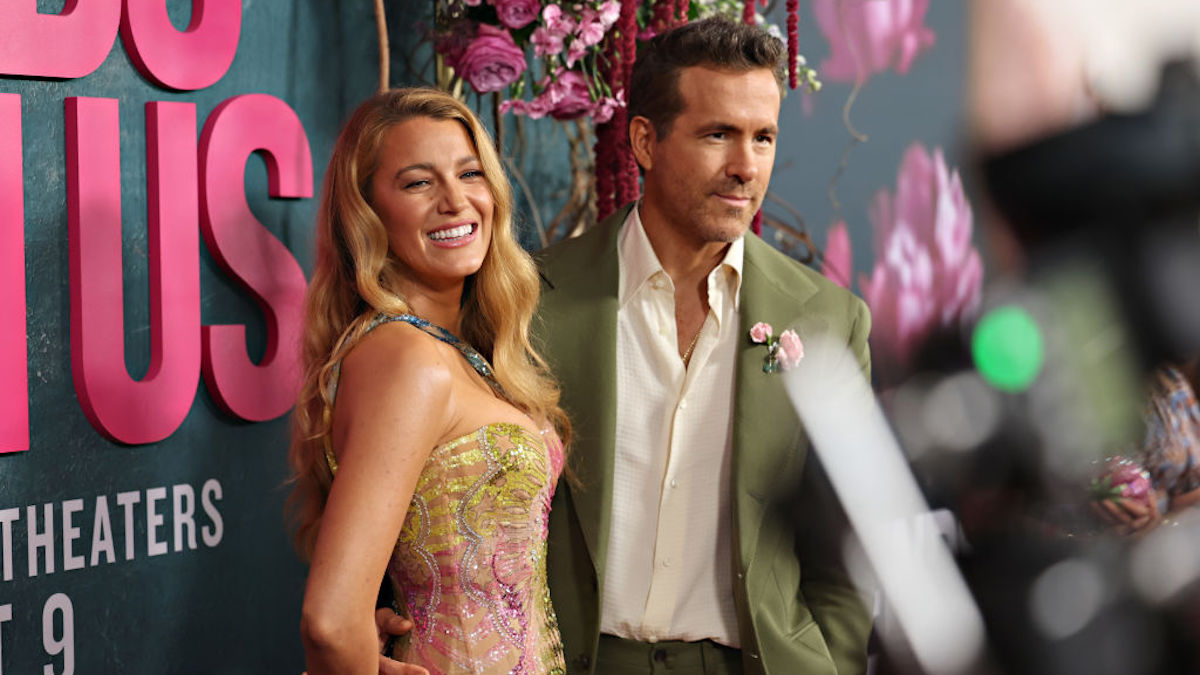‘It Ends With Us’ marketing is a disservice to the film’s message
Um, guys, are we forgetting something here?

If you were someone who had absolutely no clue what Colleen Hoover’s novel It Ends With Us was all about, the promotions of its film adaptation, featuring its lead actor Blake Lively doing cutesy things, would make you think you were in for a sweet romance with a love triangle.
What’s more, you might not even realize that another one of the film’s lead actors, Justin Baldoni, has also directed the film, and it’s his and Lively’s characters who are actually the film’s central relationship. That’s not the impression given by a lot of the film’s promos, like a hilarious interview-crashing video of Deadpool & Wolverine stars Ryan Reynolds and Hugh Jackman and Reynolds’ mother hyping up actor Brandon Sklenar as the romantic hero to watch out for.
Sklenar character, Atlas, has comparatively less to do in the film compared to Baldoni’s Ryle. And it’s a bit weird to be promoting the character as some dreamboat—for this film at least.
Add to that Baldoni’s conspicuous absence from cast red carpet photos and interviews, which has fanned the flames of speculation about some beef between Lively and Baldoni. As per reports, the cast has unfollowed the Jane The Virgin actor on social media, and fans are wondering if they’ve got another Don’t Worry Darling promotional strategy on their hands. After all, these are all professional actors who are very capable of faking it in front of the camera. So if they’re not even bothering to do that, does the drama really run that deep—or is all the gossip meant to be a publicity stunt after all?
There’s a major problem with this whole promotional strategy though—it’s a disservice to the film’s message. You see, It Ends With Us isn’t just another romance; it’s a story about domestic violence and the generational cycle perpetuated by abusive relationships. And sadly, no one other than director Justin Baldoni seems to be talking about it.
The Colleen Hoover novel that the film is based on got quite popular on BookTok and Bookstagram in 2021, almost five years after it was published in 2016. There was some criticism about Hoover’s writing style, but more importantly, of how the book seemed to romanticize an abusive relationship. Fortunately, the film doesn’t go down that road.
The relationship between Blake Lively’s flower shop owner Lily Bloom and her hot, rich neurosurgeon husband Ryle Kincaid (Baldoni) may start off all sexy banter and cheesy romance, but the film very effectively and tactfully tackles the emotional mindspace of abuse victims and an abuser, and lays out clearly that there’s no other way of looking at this. And that the only safe decision is to leave such a marriage. Consider it a triumph in an almost impossible-to-win scenario: The book is almost always better than the movie; but here, even if not completely, the film does seem to fix some of the book’s missteps.
Justin Baldoni got the novel’s rights back in 2019. The actor, through several efforts including his podcast Man Enough and a book of the same name, has been rather vocal about what it means to be a man and breaking down ideas of toxic masculinity. It then makes total sense that he would be interested in adapting this novel, and actually talking about playing a character that seems to be the opposite of who he is in real life. In the few interview ops that we’ve seen Baldoni in, the Five Feet Apart director has spoken about the domestic violence theme of the film and the dark place that playing an abuser on screen would take him.
Meanwhile, actor and executive producer Blake Lively has done promotional events ranging from cute, Pinterest-worthy photo ops to launching her new haircare line, Blake Brown Beauty. There was even a Betty Blooms pop-up—a life-size version of the flower shop from the movie—in collaboration with Lively’s other business venture, the drinks brands Betty Booze and Betty Buzz.
Lively was joined at these events and the film’s red carpet by her co-star Isabella Ferrer, who plays her character’s younger version in the film, comedian/actor Jenny Slate (Allysa in the film), author Colleen Hoover, and her husband Ryan Reynolds and his Deadpool 3 costar Hugh Jackman. Lively and Jackman even did a Vogue magazine cover shoot together that was directed by Baz Luhrmann.
Meanwhile, rumors are swirling online that Lively hijacked the film and promotions, exerting her control as executive producer to change Baldoni’s intended ending.
In a recent interview, when Baldoni was asked if he’d direct the film’s sequel, he said that there were those better suited for this, and that Blake Lively seemed like she was ready to step into a director capacity.
Was that a dig? Is there really something not okay between the cast to make them act so juvenile as to unfollow each other on social media? Is this all a gimmick? Who the hell knows. But it is sure to confuse anyone who is trying to gauge what the film is about from its erratic promotions. They could go in expecting a romance and find that it’s actually a totally different film—one that deserved more sensitive conversation around domestic abuse.
One stretched explanation could be that this duality is slyly in sync with how in the film, Lily views her world. For her, it is all like a dreamy romantic movie, until reality crashes in. If the film’s promotional strategy is trying to riff on that, and that’s a big, generous if, then ultimately it’s just too elusively clever to actually land.
But one thing’s for sure, all the additional drama is definitely making it hard for people to take the film’s rather important message seriously. And that’s a shame.
Have a tip we should know? tips@themarysue.com